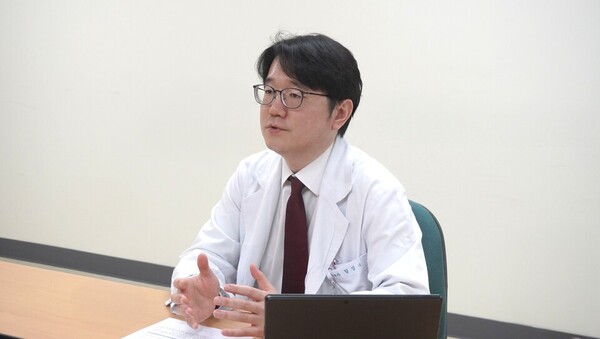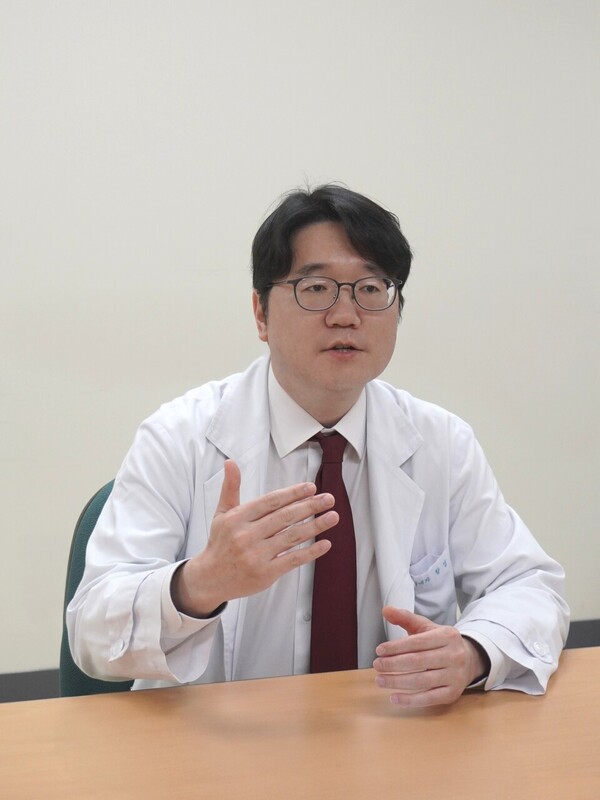Shingles is caused by the reactivation of the varicella-zoster virus (VZV), which has been dormant in the body since childhood chickenpox, due to a decline in immunity.
Studies show that 98-100 percent of Koreans over 20 are infected with the virus, so anyone is at risk of developing shingles.
Patients with inflammatory bowel disease (IBD), such as Crohn's disease and ulcerative colitis, have a 1.68 times higher risk (IRR=1.68, 95 percent CI 1.53-1.84) than the general population. This is partly due to the IBD and the immunosuppressants used to treat it increasing the risk of developing shingles. Studies found that people in their 20s with IBD had a similar risk of developing shingles as healthy adults in their 60s.
Prevention is key, as shingles can be extremely painful and can lead to serious complications, including nerve pain, vision loss, and facial scarring. In addition, about one-third of IBD patients must temporarily or permanently discontinue their immunosuppressive medications due to shingles, which negatively impacts the effectiveness of their IBD treatment.
In its IBD Vaccination Checklist, the Korean Association for the Study of Intestinal Diseases recommends vaccinating all IBD patients over 50 with the recombinant vaccine Shingrix. Even if you are younger than 50, it is recommended for high-risk individuals with a history of shingles or repeated use of corticosteroids.
Korea Biomedical Review spoke to Professor Hwang Sung-wook of the Department of Gastroenterology at Asan Medical Center about the risk of developing shingles in patients with inflammatory bowel disease and the importance of vaccination.

Question: How much higher is the risk of developing shingles in patients with inflammatory bowel disease than in the general population?
Answer: Depending on the study population, the incidence of shingles in patients with inflammatory bowel disease is reported to be about 1.5 to two times higher than in the general population and as high as three to four times higher depending on age and medications. Postherpetic neuralgia, a common complication of shingles, is also known to occur at a higher frequency in IBD patients than in the general population.
Q: Why?
A: A severe inflammatory condition is an immune disruption, which naturally leads to decreased immunity. Just as a prolonged cold is described as an immunocompromised state, prolonged severe inflammation in inflammatory bowel disease is itself an immunocompromised state.
Many medications used to treat inflammatory bowel disease are in the immunosuppressive class. While the medications reduce inflammation, the patient may be immunosuppressed by the disease or medication. Therefore, efforts have been made to minimize disease exposure by proactively vaccinating against vaccine-preventable diseases. In particular, vaccination against diseases such as hepatitis A, hepatitis B, pneumonia, and influenza are already specified in guidelines and are actively pursued in clinical practice.
The vaccines for hepatitis A, hepatitis B, influenza, and pneumonia are quadrivalent, so patients who are on immunosuppressive medications can receive them without any problems. However, the main problem with shingles vaccination is that the existing vaccine is a live vaccine.
Q: What were the limitations of the existing live shingles vaccine?
A: You can't get the live vaccine if you take or start immunosuppressive medications. You can't start using immunosuppressive inflammatory bowel disease medications until one month after vaccination. This has resulted in delays in the treatment of inflammatory bowel disease and, in some cases, patients suffering from severe symptoms of IBD who require immediate initiation of immunosuppressive or steroid therapy. These practical challenges meant that live vaccines were rarely administered.
In addition, the existing live shingles vaccine was not highly effective. The live vaccine is only 50-60 percent effective at preventing shingles, and it becomes less effective with age, with most protection waning after seven to eight years. For this reason, it is recommended that people who have received the live vaccine in the past should be re-vaccinated with Shingrix.

Q: What is the additional burden of a shingles outbreak on people with IBD?
A: An outbreak of shingles can result in patients having to stop taking their medications for a week or two and, in severe cases, up to a month. This harms the prognosis of patients. In my clinical practice, I have often seen cases of IBD worsening in this way.
Postherpetic neuralgia is another difficulty facing patients. Even when the skin lesions have healed adequately, nerve pain persists, requiring additional neurological or dermatologic medications.
Especially with shingles, you're not protected once you've had it. It tends to recur a second, third, and fourth time in the same person, and the odds of recurrence are higher than the odds of a first infection.
I've had patients who have had shingles four times. After taking a powerful immunosuppressive drug, she had outbreaks almost every year. This resulted in significant medical expenses and disruption to her economic activities. Fortunately, she was immunized with Shingrix and has not had any further infections since.
Q: What has changed since the introduction of the genetically recombinant shingles vaccine Shingrix in Korea?
A: The paradigm of shingles vaccination has completely shifted. First, it is more effective than the existing live vaccine. It is more than 90 percent effective in the general population, with a long-term duration of protection of more than 10 years. Previous studies have shown more than 60-70 percent protective effect, even in patients taking immunosuppressive drugs. Although data on long-term protection is still lacking, it is expected to be similar to that of the general population.
In addition, because it is a genetically recombinant vaccine, it can be administered at any time, regardless of whether the patient is taking immunosuppressive drugs. As a result, shingles vaccination, which was previously an optional vaccination, is becoming mandatory. This is especially true in hospitals like ours, where there are many patients with severe IBD.
Q: What do domestic and international guidelines recommend for Shingrix vaccination?
A: The Korean Society for the Study of Intestinal Diseases recommends shingles vaccination for immunocompromised IBD patients 18 and older, and international guidelines also prioritize the recombinant vaccine.
Q: Do patients need more shingles vaccinations based on their medications?
A: When a patient with IBD is first seen, the current disease state and the likelihood of future use of immunosuppressive medications will be assessed. We analyze various prognostic factors, including the severity of the inflammation, the extent of the involvement, and the patient's age. If the patient is likely to use immunosuppressive medications in the future, we recommend prophylactic vaccination.
Some immunosuppressive medications, including the newer small molecule agents, are known to be associated with a relatively higher risk of developing shingles. As a result, shingles vaccination is increasingly recommended before starting immunosuppressive therapy.
Q: What are healthcare providers' perceptions of the Shingrix vaccination?
A: When a new vaccine is introduced, it is common for healthcare providers to be concerned about unknown side effects. Even at the time of the launch of Shingrix, there was some concern among healthcare providers. Significant body aches, including fever, muscle aches, and headaches, often accompanied the vaccine. Given that IBD is often associated with severe colds, there was concern that it might exacerbate IBD.
However, data from studies to date have not shown evidence of worsening of IBD as a result of the Shingrix vaccination. In addition, as experience has accumulated over the past year or two, there is a growing consensus that these side effects are not a cause for concern and that the benefits of immunization are significant. In recent years, healthcare providers have become more aggressive in recommending Shingrix vaccination.
Q: What are the responses of patients advised to get vaccinated?
A: Two doses of Shingrix cost about 500,000 won ($347), but the cost of a shingles outbreak offsets this, making the vaccination essential.
The problem is that conventional immunizations for flu, pneumonia, and other diseases are already costly. Patients tend to feel embarrassed when they come for treating IBD and are told they need vaccination, which can cost hundreds of thousands of won.
The good news is that the general public has widely recognized the importance of vaccination. In recent years, IBD patients have become more aware of the need for vaccination and are increasingly getting vaccinated without much resistance.
Q: There are calls for government support to increase access for patients. What do you think?
A: IBD patients are mostly young. While parents may be able to provide financial support for teenagers, it can be difficult for patients in their 20s, 30s, or 40s to accept the fact that the vaccination alone will cost about 1 million won. Therefore, providing selective government support for these IBD patients would be very effective.
Currently, the government supports pneumonia vaccination for older adults. Similarly, selective government support for these vaccinations for patients with IBD or severe immunocompromised conditions, including autoimmune diseases, would go a long way toward preventing unnecessary suffering.
Q: Some patients may be reluctant to seek treatment for IBD out of concern about infectious diseases.
A: One of the biggest concerns among IBD patients is drug-related side effects. As the name immunosuppressant implies, there is a significant concern about infections that can occur due to decreased immune function. In the case of shingles, we've already mentioned that the risk increases from 1.5 to two times to as much as three to four times that of the general population.
However, the risk for many other infectious diseases is similar, generally ranging from 1.5 to two or three times that of the general population. This is insufficient to cause patients to avoid treatment or be overly concerned about infectious diseases.
In addition, good vaccines are constantly being developed against the infections that patients are concerned about. For example, in the case of pneumococcal vaccines, only 23-valent polysaccharide vaccines were available in the past, but improved vaccines, such as 13-valent protein conjugate vaccine (PCV13) and now 15-valent protein conjugate vaccine (PCV15), continue to be introduced. Given these circumstances, outbreaks of significant concern in clinical practice appear rare, provided treatment is adhered to, and vaccination is aggressively implemented.
Q: Every year, the last week of February is Shingles Awareness Week. Do you have any advice for patients with inflammatory bowel disease?
A: The concept of immunization can still seem foreign. You may feel overwhelmed when you are suddenly presented with the high cost of vaccinations. Nevertheless, the importance of vaccination is a common theme in guidelines for IBD worldwide. Not only are infectious diseases more expensive to treat, but they also have a much broader impact on the course of IBD. This is why it is so important to immunize against pneumonia, flu, hepatitis A, hepatitis B, and hepatitis C, as well as shingles with Shingrix.
In addition, the cost of the vaccine is currently a barrier to many people with IBD. We hope that social awareness of the importance of shingles vaccination will be expanded and national support will be provided, if selectively.
Related articles
- Efficacy study of Genematrix’s new shingles vaccine candidate published in ‘VIROLOGY’
- [Reporter's Notebook] The unfulfilled promise of expanding national immunization program
- ‘Shingrix offers shingles preventing opportunity for rheumatology patients’
- MSD Korea to stop supplying shingles vaccine Zostavax due to weak demand
- EuBiologics wins green light for phase 1 trial of shingles vaccine
- Why is Shingrix, the only shingles vaccine available for cancer patients, so painful?
- GSK’s Shingrix tops singles vaccine sales in Korea in 2023: IQVIA data
- GC Biopharma’s US affiliate Curevo pulls in $110 mil. to challenge GSK’s Shingles vaccine
- Korean researchers lead Asia's largest study on pediatric inflammatory bowel disease
- Researchers reveal regional disparities in hepatitis C prevalence

